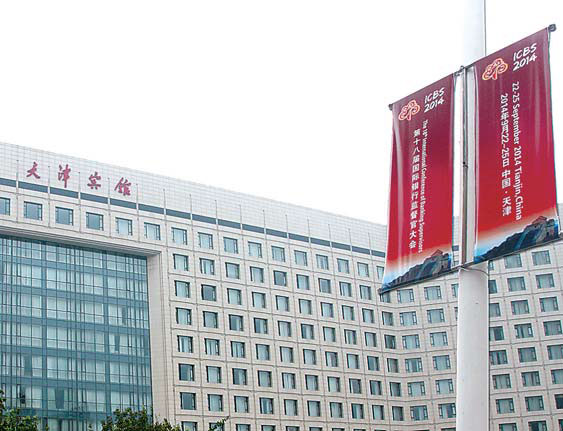Tianjin wants to bring home the money
The local government in Tianjin plans to accelerate the development of the financial sector in the city and rebuild its position as an influential financial hub in North China.
Tianjin's financial industry reached its peak in the 1940s. At that time, the city was home to seven bank headquarters, 33 bank branches, 17 foreign-invested banks, more than 50 insurance companies, 88 pawn shops and 228 foreign-invested insurance institutions.
The city then ranked the second among all Chinese cities in terms of the total capital of foreign banks, as well as its Chinese banks having the most capital among all the cities in North China. It also held the top position in terms of the number of foreign-invested insurance institutions.
|
The exterior of the venue for the ongoing international conference of banking supervisors. Su Hang / China Daily |
It generated 18 percent of the bank turnover in the country and accounted for about one-fifth of the nation's deposits and loans.
The city became a pioneer in the financial sector after the People's Republic of China was founded. The first State-owned stock exchange was established in Tianjin in 1949. And in 1951, the Tianjin Investment Company started to issue stocks.
In 2005, the central government made a strategic decision to develop the Binhai New Area of Tianjin and make the area a growth engine for the Chinese economy like the Shenzhen Special Zone and the Pudong New Area in Shanghai.
This decision also played a favorable role in driving the development of the financial industry in Tianjin, which has become one of the pillar industries in Tianjin.
By the end of June this year, assets of financial institutions in Tianjin totaled 4.4 trillion yuan ($684.8 billion), up 15 percent from the same time last year.
In the first six months of this year, the city's financial industry generated gross profits of 63.2 billion yuan, up 13.8 percent from the same period last year, accounting for 8.8 percent of Tianjin's GDP over this period and more than 10 percent of the city's economic growth.
The city now has 1,360 entities offering financial and related services.
Tianjin is one of a few Chinese cities that have all kinds of financial business qualification licenses. It has established a comprehensive financial system that includes banking, insurance, securities, trusts, accounting, currency broking and foreign currency exchange.
New financial businesses, such as financial leasing, private equity and commercial factoring, are also developing fast in Tianjin.
The city has 235 corporate bodies engaged in financial leasing with a total registered capital of 98.7 billion yuan and leased assets of more than 450 billion yuan. Tianjin is among the top cities in China in terms of the number of such companies and the scale of their business.
In recent years, the city has launched many innovative initiatives in the financial sector, as the central government approved some pilot programs in Tianjin and offered favorable policies.
The nation's first renminbi industrial investment fund was established in Tianjin, as was the nation's first Internet monetary fund. The city also received approval to open the nation's first private banks.
The city has opened 11 new types of trade markets, including Tianjin Equity Exchange, and successfully hosted the China International Private Equity Forum from 2007 to 2014.
Tianjin has become a major player in the nation's financial reform and an ideal investment destination.
Local officials say Tianjin will further enhance its financial reform and innovation and achieve new developments in the sector, as tremendous opportunities lie ahead because of the national strategy that calls for joint development for Beijing, Hebei and Tianjin to improve the region's overall competitiveness.
hantianyang@chinadaily.com.cn



















